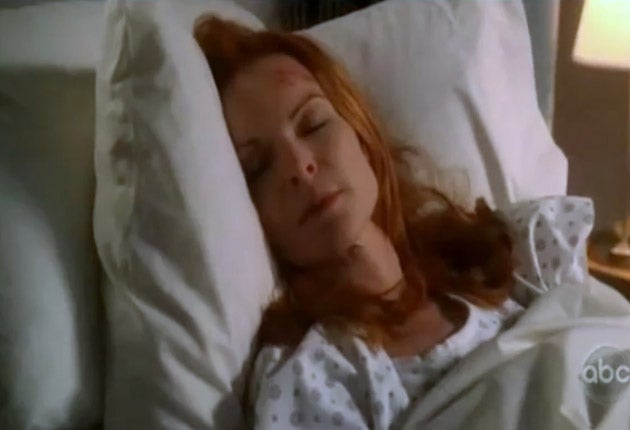Sick and tired of television's trailer trash
Programme-makers are ruining their shows with lengthy spoilers that give far too much away, says Fiona Sturges

So, there I was sitting at home last week watching Desperate Housewives and, just as it finished, up popped a trailer for next week's episode.
I tried not to look, but it appeared before the credits had rolled and the remote control had sunk into a crack in the sofa. Short of lobbing a missile at the screen or shutting my eyes and singing at the top of my voice, there was nothing I could do. Thus, within 30 seconds of the programme ending I already knew that Lynette's mother-in-law's dementia would take a terrible turn, that Susan was going to set about her blackmailer with a baseball bat and Bree's new man would reveal a jealous streak. Oh, hang on a minute, I'm sorry. Did I spoil it for you?
Fortunately that episode will have aired by the time this is printed. But TV schedulers clearly have no qualms about marring upcoming episodes by offering little tasters of what's to come a whole week beforehand. The idea of these spoilers – or teasers, as they call them in the business – is to whet our appetites with regard to what will happen next and keep us hooked until the end of the series. But the actual effect is to prevent us from digesting what we have just seen, from basking in the afterglow of a well-executed (or not) drama, and to mentally catapult us into the next episode long before we are ready.
You might imagine that this in-your-face style of promotion would be restricted to non-terrestrial channels and those known for carrying advertising. Since Channel 4 and ITV1 have always had ad-breaks, it's perhaps not surprising that they see fit to flag up their own programmes in this way. But BBC1's The Apprentice is another show which, following the weekly firing of a candidate – the culmination of an hour-long build-up – takes the wind out of our sails by segueing straight into a précis of next week's instalment. Although it doesn't go as far as giving away who will be fired, there are occasions where the excerpts shown can lead one to make an educated guess.
Often these so-called teasers can interfere with the drama itself. I remember an instance in Desperate Housewives when it seemed, at the close of an episode, that Bree had been killed after plane crashed into Wisteria Lane. The ensuing trailer soon put paid to that by showing her sitting up in a hospital bed. So much for cliff-hangers.
In fact, some TV teasers can be so detailed as to make the full-length episode practically redundant – surely not what the schedulers intended.
Of course, television shows need to advertise their existence. But there are, surely, ways of reinforcing your brand without ruining the viewers' enjoyment of the very show you are trying to promote. At the risk of generalising, the presence of plot teasers often seems to mark programmes out as lowest-common-denominator entertainment, the kind that demands little from viewers and is perhaps easily forgotten (recent exceptions include Downton Abbey and Single Father, two superior dramas that cheapened themselves with spoilers). It could be seen as a reflection of their quality that schedulers appear not to trust their viewers' commitment, or rather they assume their minds are so sieve-like that they need an instant nudge to remind them to watch it next time.
In the case of the current schedule-hogger I'm a Celebrity... Get Me Out of Here! the spoilers come thick and fast, arriving within the show and before each ad break. There are two ways you might interpret this. Either the producers deem the audience to be so dim-witted that they might wander off into the kitchen and forget that they were ever watching telly, or that the drama on screen is so paltry that they have opted to fill in the gaps with miniature re-runs.
The moral of this story, perhaps, is to stop watching low-rent programmes. Good television has confidence in itself and its viewers. It understands how to draw us in, hold our attention and keep us interested even when it's not on the screen. It knows when to dazzle us and when to leave us alone. And it certainly shouldn't have to beg us to watch it next time.
Join our commenting forum
Join thought-provoking conversations, follow other Independent readers and see their replies
Comments
Bookmark popover
Removed from bookmarks